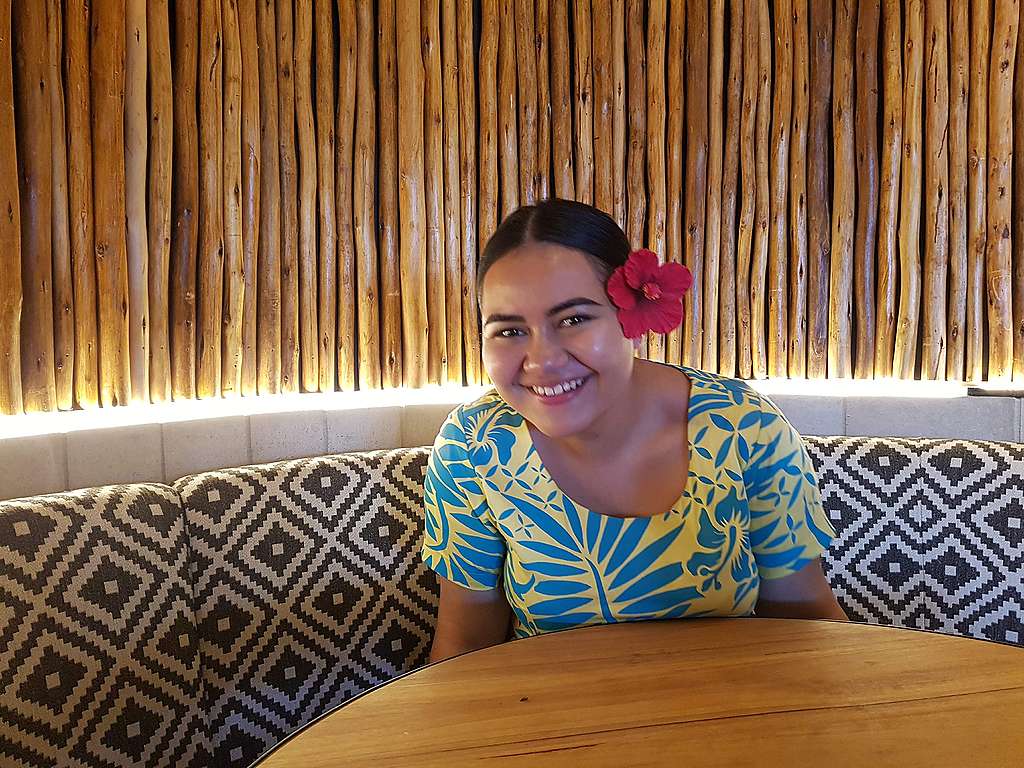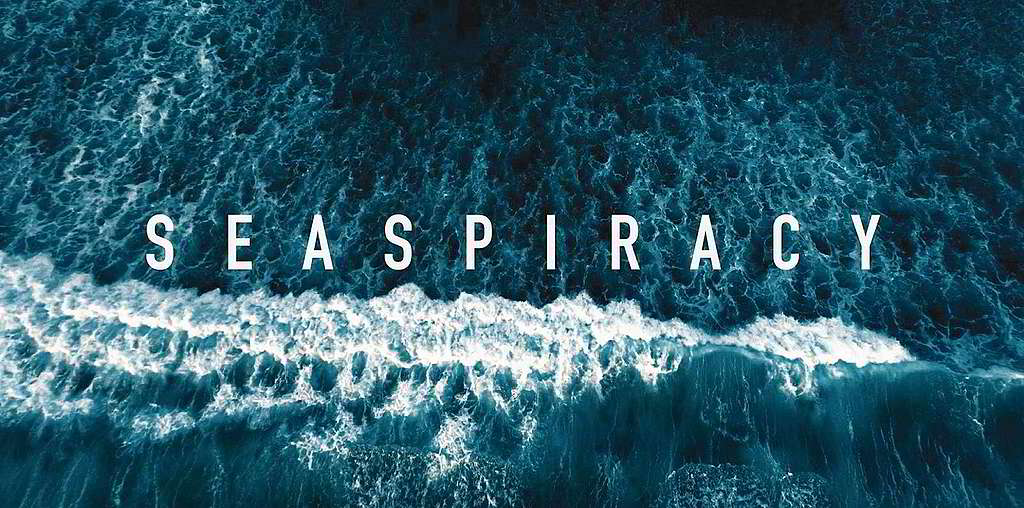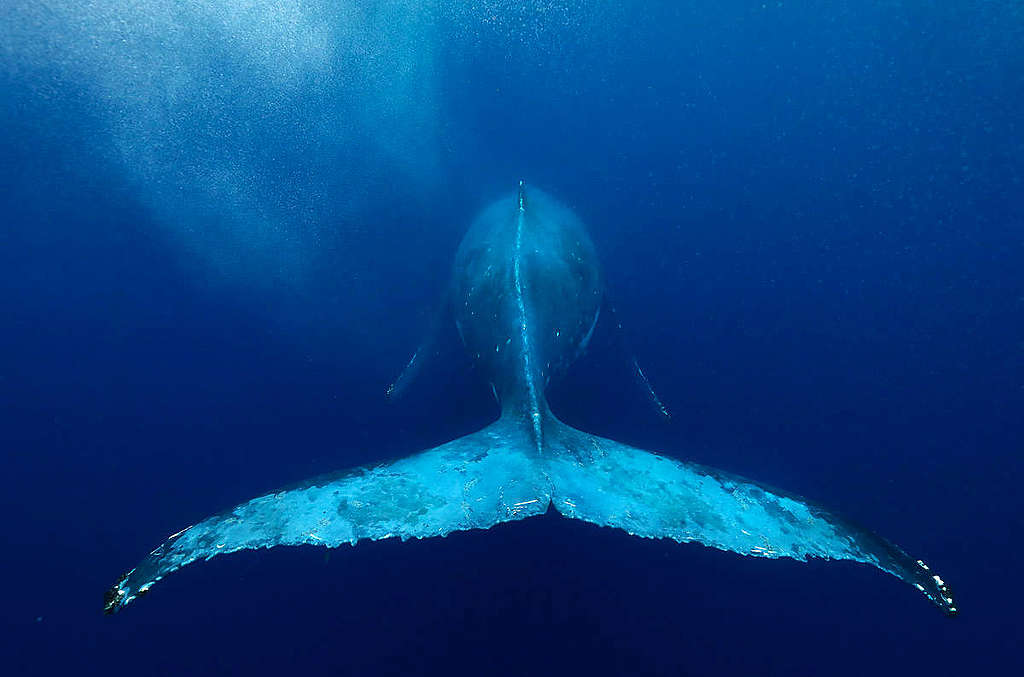Pacific Climate Activist Brianna Fruean, from Samoa, speaks to Greenpeace about Seaspiracy, the indigenous voices it leaves out, and her vision for the future of the ocean.

Seaspiracy has been viewed by thousands across the world, getting people talking about ocean issues and the most pressing threats facing it. What did you think of it?
I feel like anytime something that has to do with the ocean and the environment shocks people it’s good because it gets the conversation going, and I am grateful that this has been produced. I see a lot of young people starting to talk about the oceans. Blackfish came out when I was young, when I was in primary school, and it was something that my older sister’s generation was talking about, but it missed the interest of my age group.
There have been other documentaries about the ocean that have come out that I don’t think Generation Z caught, so I think this is such a good time to bring these reminders back into the conversation and pique the interest of young people and shock them because the state of our oceans is shocking.
Was there anything that you weren’t aware of in the documentary that shocked you?
I didn’t know the labour practices were so bad, I didn’t know how exploited workers out at sea were that work within the bigger companies. Everytime I think of fishermen I think of the fishermen or women back home in Samoa that have ownership over what they get to do. As people who depend on the ocean and seeing the documentary and how horribly some of these workers are treated, that was shocking for me. But I’m lucky enough to work in this space so I know the greenwashing, the trauma faced by ocean mammals, and the conversation that goes on around that.
Read Misery at Sea: human suffering in Taiwan’s distant water fishing fleets.
Was there anything that you found was off or part of the story that wasn’t told?
Yes I feel like there was part of the story or part of the perspective that was lacking which is the indigenous perspective or a Bipoc perspective of oceans. I think if you’re going to talk about such a big issue as oceans you need to be talking to the people who’ve known how to take care of the ocean for centuries. For instance, I wouldn’t talk about sustainability in Aotearoa without talking about Māori people because they know how to sustain the land and the ocean here in Aotearoa, so I think that was a bit of a part missing.
And when you don’t include Bipoc and indigenous views you also risk speaking from a white saviour type of tone which I think a lot of people especially Bipoc people picked up on in the documentary. There was no real acknowledgement of the solutions that can come out of indigenous communities. And there was a lot of messaging around there’s no such thing as sustainable fishing when my belief as an indigenous woman is my people know how to fish sustainably.
A Samoan practice is that when we fish we always put the first fish back into the water and that is a sign of respect for the ocean. Because we treat the ocean like a living thing, a living, breathing thing within our culture. I’ve always believed that my elders knew how to live in harmony with the ocean and a lot of the times when we’re talking about trying to save the ocean we miss a huge chunk of the narrative that comes from indigenous communities.
“When we fish we always put the first fish back into the water and that is a sign of respect for the ocean.”

Are there solutions from your home nation that you could see being applied as a solution to the ocean crisis?
There’s a common thread amongst most indigenous communities that everything in life has to have balance, and this is not necessarily one particular thing that you do like changing your straw or your keep cup – it’s a way of living. You have to live your life knowing that there is a cause and effect. And I think that many people living within a capitalistic world don’t think about where things end up. And that was the great thing about Seaspiracy is it forces us to think about like when you’re eating canned tuna you have to think how did that get to your table, or where does this go afterwards? What is the effect of you buying this? That’s the messaging I could see the documentary having.
But I also know that indigenous people have lived with this knowledge forever and they’re always thinking about what is the cause and the effect, what is the impact of small choices because they add up. I always try to think about how my elders lived, they would only eat meat on very special occasions because it wasn’t sustainable to have bacon in the morning and have a meatloaf sandwich at lunch and a steak dinner at night. That wasn’t sustainable in pre-colonial Samoa times, so I try and think about those ways of living and how we can decolonise our ways of thinking within this capitalistic world to be more sustainable.
And what about the climate aspect to the ocean story. The ocean is the largest carbon sink, and that some of the things we’re doing to it are preventing it from sucking up carbon and performing that amazing role. What’s your take on that?
I’m someone who has always seen the ocean as something that is a victim of climate change and not necessarily the aggressor. Sometimes the ocean is painted as the thing that is taking our land, or painted as a villain especially in the Pacific Islands because one of the biggest concerns for us is going below sea level, is actually drowning in this climate criss. I’m a very visual person and I like to picture things as living beings. But I’ve never seen the ocean as an aggressor. I’ve always seen it as something that has been scared, a living thing that has been forced to change and there’s nowhere else for her to go but onto our land. She doesn’t want to swallow our islands but she’s almost choked into doing that. When I think about climate change I think about the ocean as a victim of it and not an aggressor or a hand that plays into this. Humans are the aggressors when it comes to the climate crisis.
The Pacific is the frontline for climate change, and fighting going underwater. But what are the other ocean issues facing the Pacific, what concerns you?
Two things really concern me, one is the coral bleaching. I’ve seen this with my own eyes, a lot of the coastal places and villages I would go in Samoa I would remember them being so colourful growing up and in recent years the life has been sucked out because of the climate becoming warmer.
Another thing I’m concerned with is the change in ocean temperature which is a huge concern for coastal communities, our fish are going deeper to find cooler water and for a lot of the fishermen and women in the islands, they have never known how to go so far out to fish. They’re going out in little canoes and boats that aren’t made for going that deep. It’s so dangerous for them to keep going deeper and deeper to find these fish that are trying to find cooler waters to survive in, so that’s a big concern for me as a Pacific Islander.

How does it make you feel to see these changes happen in your short lifetime?
There’s a quote that I love it’s from a Pacific Island poet her name is Teresia Teaiwa, she says that we cry saltwater and that’s how we know the ocean is within us. I live by this quote. I do believe that we are of the ocean and are from the ocean. A lot of people get confused when they ask “where are you from?” and I say “I’m from a big ocean state” because a lot of the time you’re expected to say you’re from a small island, but I believe I’m from a big ocean. Because my mana and spirit is tied so closely to the Pacific Ocean, seeing it hurt and seeing it become this thing that my ancestors would be sad to see, it breaks my heart. I do really want to see change.
Have you read much about the threat of deep sea mining in the Pacific? Right now there are companies from the Global North running preliminary tests out in the Pacific. They claim this is going to make Pacific Islands rich and that it will be the solution to the fossil fuels crisis. What do you think about this?
Every time I read something about exploration of the deep sea mining that’s been happening, this goes for me and it goes for other climate activists – we don’t want it. We don’t want these people in our ocean, we don’t want people to be taking, to be exploiting our ocean the way they plan to with deep sea mining. Like I said, I believe in balance, and to the core of indigenous cultures it’s about balance with nature. Taking something so deep down – there’s a reason it’s so deep and why it should be out of the reach of humans because it’s meant to stay there. That is my belief.
“Because my mana and spirit is tied so closely to the Pacific Ocean, seeing it hurt and seeing it become this thing that my ancestors would be sad to see, it breaks my heart.”
Is there anything else you’re working on that you’d like to tell people about?
I think I would just like to say that with the Seaspiracy conversation, something that I would advise people to do when you watch documentaries like this, like Blackfish any type of narrative of the environment that is painted from a white lens, to always question it, because you’re not getting a full picture. Moving forward we have to be including people who know how to take care of the environment in these conversations. And that is not negating how powerful these documentaries are, people get very defensive, but I do believe it’s a good documentary and that it’s changing a lot of people’s lives.
I would encourage that when you hear criticism about it, it’s only coming from people who want to see narratives told better. Not necessarily they don’t want the narratives at all but constructive criticism will only help us to have better and fuller stories and move faster towards more sustainable ways. I do believe that everyone who loves the ocean cares about the ocean, we all have one purpose, it’s to protect the ocean, but if we can move together rather than fight and debate about technicalities I think we can be moving faster.
If you could change something tomorrow, or if you have a magic wand, what would you do with it?
If I had a magic wand I would take all the commercial fishing boats out of the ocean, I would pick them all out. Then I would take a bunch of mamas and papas who’ve been fishing for centuries in sustainable ways and I would get them to teach the rest of us how we should take care of the ocean.
Read more: So you watched Seaspiracy, what now?

Seabed mining is a new threat to the oceans. Now is our chance to prevent the destruction before it’s too late.
